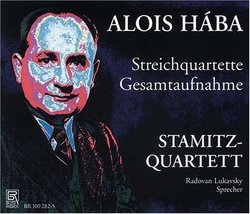Essential for admirers of contemporary Czech music
Thomas H. Ayers | Bowie, MD United States | 03/17/2007
(5 out of 5 stars)
"I've been enjoying contemporary Czech classical music for years, from the familiar Janacek and Martinu to the more obscure Jindrich Feld, Zdenek Lukas and Miloslav Kabelac. Because of his innovating reputation, I tried Alois Haba's music but didn't care for it. However, this set being the FIRST COMPLETE RECORDING of his 16 string quartets, plus a piece originally written for harmonium and a work for voice and string quartet, I decided to renew the acquaintance and gave it a try. Pleasantly surprised, I haven't stopped listening!
The set begins with his Op.4 quartet, which is so beautiful and reminiscent of Martinu's early work. However, the second quartet is a plunge into quarter-tone writing. Subsequent quartets explore other systems. He would return to "normal" writing from time to time, but these later quartets clearly bear the stamp of what came before. The results are always fascinating and sometimes very beautiful. These quartets are truly enjoyable music, not mere experiments.
Caveats: Haba was one of the pioneers of quarter-tone and microtonal music. He invented instruments (e.g. quarter-tone piano, sixth-tone harmonium) to facilitate performance of his unusual music, of which he wrote a lot. Sadly, works with titles like "String Quartet No. 11 in the sixth-tone system" or "Nonet No. 2 in the seventh-tone system" suggest academic experiments, not heartfelt communications, and may actually scare people away. To add insult to injury, he preferred to compose "athematically," which means that melodies and motifs are briefly encountered and not repeated. Rather, each work is like a travelogue, where you don't stop to ponder a particular sight for very long. In this regard, his music resembles that of Carlos Chavez at one stage of his career, and it demands constant attention to appreciate the journey.
Surprises: Haba's adoption of microtonal systems enabled him to be more expressive. Anyone who has played a piano or organ that's out of tune can attest that the music that results can be oddly rich and fascinating. The same is true of Haba's music, if you give it a chance. Haba maintained that microtones helped propel the music forward, and it's often true. His rhythms are exciting. His melodies are often beautiful, but, because he composed athematically, they become slippery and change into something else. The results can be stirring: a breathtaking drive through gorgeous and sometimes disturbing territory.
Anyone who enjoys Haba's music will not regret buying this set. The works are played beautifully and with real feeling. Curious listeners are urged to give it a try. (And why not? How often do you get to listen to music composed in quarter-tone, fifth-tone, or sixth-tone systems?) I recommend beginning with disc 3 (quartets 7-11), which contains three "normal" works (the first on the disc being non-athematic!) and two microtonal ones. After acclimating to his "athematic" style by quartet No. 9, you'll be pleasantly surprised by how the microtonal systems enrich it in quartets Nos. 10 & 11. The rest of the cycle is just as deserving of your attention. Worth buying. (For those who like this set, I recommend Ben Johnston's string quartets, which are just as rewarding.)"


 Track Listings (7) - Disc #1
Track Listings (7) - Disc #1